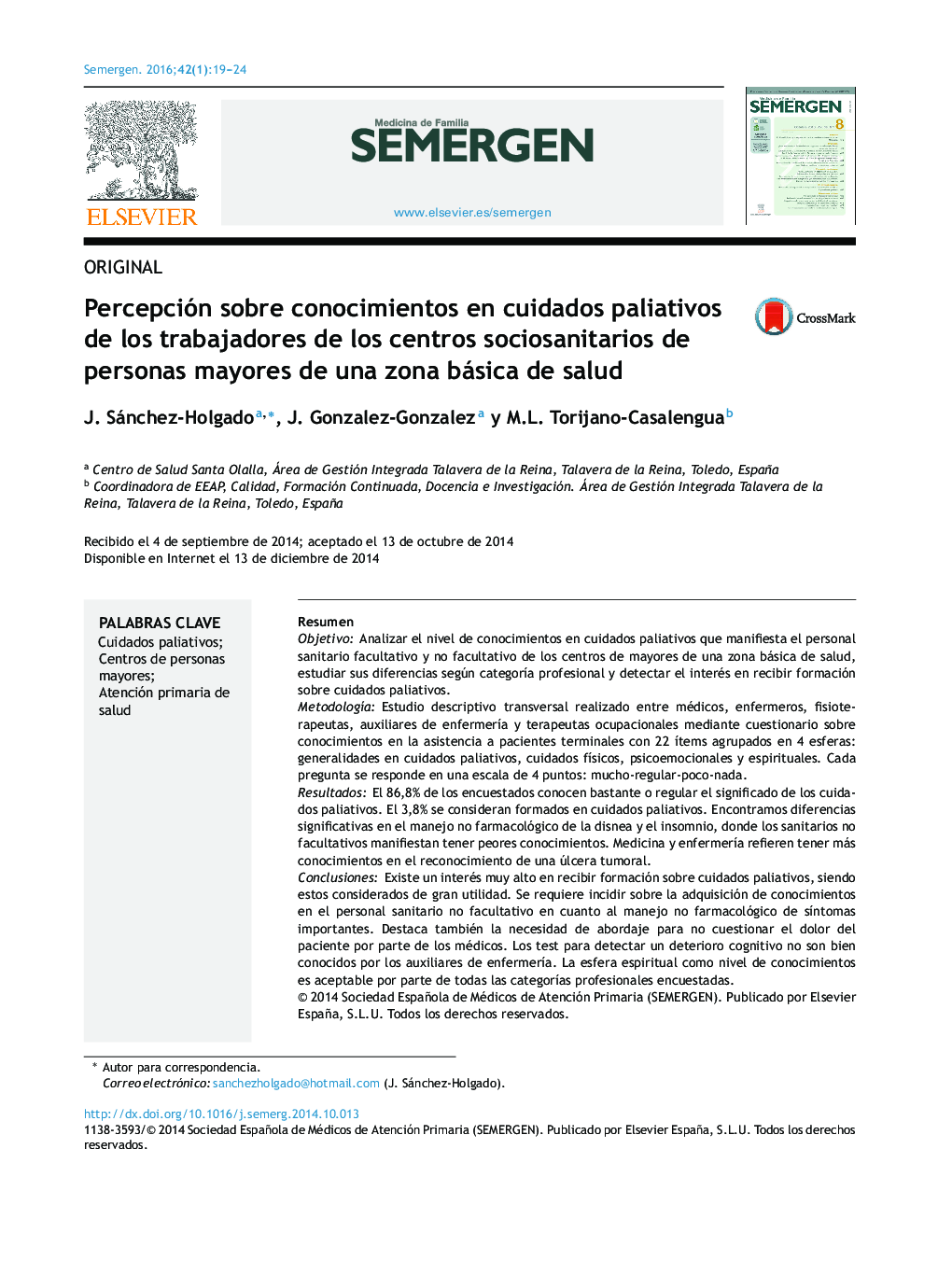| کد مقاله | کد نشریه | سال انتشار | مقاله انگلیسی | نسخه تمام متن |
|---|---|---|---|---|
| 3834631 | 1247325 | 2016 | 6 صفحه PDF | دانلود رایگان |
ResumenObjetivoAnalizar el nivel de conocimientos en cuidados paliativos que manifiesta el personal sanitario facultativo y no facultativo de los centros de mayores de una zona básica de salud, estudiar sus diferencias según categoría profesional y detectar el interés en recibir formación sobre cuidados paliativos.MetodologíaEstudio descriptivo transversal realizado entre médicos, enfermeros, fisioterapeutas, auxiliares de enfermería y terapeutas ocupacionales mediante cuestionario sobre conocimientos en la asistencia a pacientes terminales con 22 ítems agrupados en 4 esferas: generalidades en cuidados paliativos, cuidados físicos, psicoemocionales y espirituales. Cada pregunta se responde en una escala de 4 puntos: mucho-regular-poco-nada.ResultadosEl 86,8% de los encuestados conocen bastante o regular el significado de los cuidados paliativos. El 3,8% se consideran formados en cuidados paliativos. Encontramos diferencias significativas en el manejo no farmacológico de la disnea y el insomnio, donde los sanitarios no facultativos manifiestan tener peores conocimientos. Medicina y enfermería refieren tener más conocimientos en el reconocimiento de una úlcera tumoral.ConclusionesExiste un interés muy alto en recibir formación sobre cuidados paliativos, siendo estos considerados de gran utilidad. Se requiere incidir sobre la adquisición de conocimientos en el personal sanitario no facultativo en cuanto al manejo no farmacológico de síntomas importantes. Destaca también la necesidad de abordaje para no cuestionar el dolor del paciente por parte de los médicos. Los test para detectar un deterioro cognitivo no son bien conocidos por los auxiliares de enfermería. La esfera espiritual como nivel de conocimientos es aceptable por parte de todas las categorías profesionales encuestadas.
ObjectiveTo analyze the level of knowledge in palliative care that health and non health housing for the elderly workers refer, to study the differences between professional categories and to detect their interest in receiving palliative care training.Patients and methodsCross-sectional study conducted among physicians, nurses, physiotherapists, nursing assistant and occupational therapists applying a questionary assisting terminal patients with 22 items grouped into four sections: generalities palliative care, physical care, psycho-emotional and spiritual. Each question is answered using a four point scale in much-regulate-little-nothing.Results86.8% of respondents know quite what they mean or regular palliative care. 3.8% consider themselves sufficiently trained in palliative care. We found significant differences in non-pharmacological management of dyspnea and insomnia where concerns have less knowledge worker. Medicine and nursing reported having more knowledge in the recognition of a tumor ulcer.ConclusionsThere is a very high interest in receiving palliative care training and these are considered very useful. Required impact on the acquisition of knowledge in the medical staff not optional as to non-pharmacological management of major symptoms It also emphasizes the need to approach not to question the patient's pain by physicians. The test to detect cognitive impairment are not well known for nursing assistants. The spiritual realm is the acceptable level of knowledge on the part of all professional categories surveyed.
Journal: SEMERGEN - Medicina de Familia - Volume 42, Issue 1, January–February 2016, Pages 19–24
